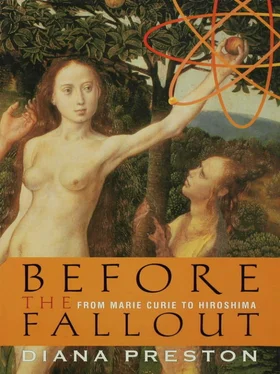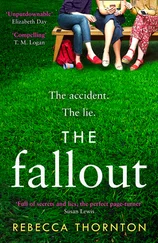• • •
Kapitza’s was not the only departure from the Cavendish. James Chadwick, highly impressed by the performance and potential of Lawrence’s cyclotron, was growing restive. As he later wrote, “It was becoming very difficult to push on without some new equipment…. we needed a means of accelerating protons or other particles… at high energies. But that meant more space, particularly more money, and particularly engineering. It meant complicated equipment, and Rutherford had a horror of complicated equipment.”
And Rutherford would not budge. Lacking Kapitza’s shameless ability to charm and manipulate Rutherford, and anxious not to quarrel with his mentor of some quarter of a century, Chadwick thought it best to leave. In 1935, while Rutherford was embroiled in his campaign to persuade the Soviets to release Kapitza, Chadwick was offered the chair of physics at Liverpool University and accepted. Rutherford backed him, telling Liverpool they would be fortunate if they could attract Chadwick. He also backed Chadwick for the Nobel Prize for Physics, which Chadwick was awarded that year for his discovery of the neutron. It may have been nervousness that made him drop the check handed to him by King Gustav at the presentation ceremony in Stockholm. He remained a quiet, shy man who did not enjoy public occasions, which often prompted a flare-up of his digestive problems. After hearing Frederic Joliot-Curie deliver his Nobel lecture in Stockholm at the same presentation, Chadwick wrote, perhaps a little enviously, that “he was a great actor. He liked that kind of thing, and he did it very well.”
• • •
In 1937, while Chadwick was struggling to modernize Liverpool University’s primitive physics department, experimental atomic physics unexpectedly lost its linchpin. Unlike Marie Curie, Rutherford’s health had not apparently suffered from his cavalier approach to radioactive materials. (On a lecture tour in the United States he once happily discarded a paper he had used to funnel uranium salts into a tube. The paper was retrieved by his hosts, who used it as a radioactive source for forty years.) However, for some years Rutherford had been suffering from a small umbilical hernia. On 14 October he began feeling sharp stomach pains and started vomiting. His doctor operated for a routine strangulated hernia, but Rutherford suddenly worsened. On 19 October Lady Rutherford wrote in despair to Chadwick that her husband was “only hanging by a thread.” He died that evening at the age of just sixty-six.
The scientific community was shocked by the unexpected death of a larger-than-life character so full of creative energy, who had roamed his laboratory, dribbling ash from his pipe, and encouraging his researchers with raucous cries of “I feel it in my water.” During his career he had trained a dozen Nobel Prize winners. In the words of one researcher, his death left them feeling “stupefied rather than miserable.” It simply “did not seem in the nature of things.” Rutherford was cremated, and his ashes were buried near the tomb of Sir Isaac Newton in Westminster Abbey. From his exile in the United States Einstein mourned the passing of “one of the greatest experimental scientists of all time.” A tearful Niels Bohr, recently returned from a lecture tour around Japan that had included an audience with Emperor Hirohito, remarked that like Galileo, Rutherford left science “in quite a different state from that in which he found it.”
Rutherford had remained true to his philosophy that “it was not that the [nuclear] experimenters were searching for a new source of power or the production of rare or costly elements. The real reason lay deeper and was bound up with the urge and fascination of a search into one of the deepest secrets of nature.” Yet even he had come privately to suspect that scientists might not have the luxury of the disinterested pursuit of knowledge for much longer. Despite his public comment of “moonshine,” he had in the early 1930s alerted Sir Maurice Hankey, secretary of the Committee of Imperial Defence, that the Cavendish Laboratory’s nuclear work might one day be crucial to the nation’s defense. He advised the government to “keep an eye on the matter.”
• • •
At the Institute of Physics in Rome, Enrico Fermi had been following up the Joliot-Curies’ discovery of artificial radioactivity when he had an inspired thought. What, he wondered, would happen if he used neutrons instead of alpha particles to bombard elements? He reasoned that neutrons should be even more effective in producing artificial radioactivity since, having no charge, they would be more likely to penetrate the nucleus. He set to work with his small team, which included Emilio Segre. Segre recalled that like “a steamroller that moved slowly but knew no obstacles,” Fermi systematically went through the periodic table, irradiating each element with neutrons. The first eight produced nothing, but at the ninth, fluorine, the Geiger counter clicked into life, registering artificially produced radioactivity.
As Fermi progressed through the table, some of the radioactive isotopes he created were so short-lived he had to race down the corridor with them to the Geiger counters before the radioactive emissions ceased as they decayed to stability. In May 1934 he reached the final element, number 92, uranium. He found that bombarding this heaviest of metals appeared to produce one or more new radioactive elements beyond uranium in the periodic table: the so-called transuranics. Fermi published his results in a series of reports. In Copenhagen scientists crowded around Otto Frisch, one of the few able to translate from Italian. The Italian press gleefully hailed Fermi’s discoveries as proof that a Fascist Italy under Benito Mussolini had resumed its “ancient role of teacher and vanguard in all fields.”
The chemical complexities of the products formed in uranium by neutron bombardment were, for the present, too great for Fermi to interpret. However, in the process of irradiating elements with neutrons, Fermi made what he regarded as the most important of all his achievements. He discovered that the more slowly neutrons traveled, the more likely they were to penetrate the nucleus of the target. Like many of the great discoveries, it had come about through intuition. Fermi had decided on impulse to see what happened if he filtered the neutrons he was firing at his target through a barrier of paraffin. To his surprise, this increased the level of artificial radioactivity produced by one hundredfold, so that “the counter clicked madly.” Suspecting that the large amount of hydrogen in paraffin might be a factor, he experimented with another substance also containing large amounts of hydrogen: water.
Fermi’s assistants brought it in buckets from the goldfish fountain in the garden behind the laboratory, and Fermi channeled neutrons though it. The effect was the same as with the paraffin: the level of artificial radioactivity was enormously enhanced. Fermi deduced that the cause must be the protons in the hydrogen filter. They had a similar mass to the neutrons and, colliding with them, made the neutrons bounce elastically back and forth, absorbing some of their momentum. By the time the neutrons moved on to the target, their speed—ordinarily thousands of miles a second—had been sufficiently slowed—“moderated”—for them to slide more easily into the target nuclei. Fermi and his collaborators quickly filed a patent on the slow-neutron process. Unknown to them, the process would prove critical to the development of the atom bomb.
• • •
Across Europe, laboratories began replicating Fermi’s bombardment of elements with slow neutrons. Lise Meitner found his idea of transuranics “so fascinating” that she determined to pursue it. Needing the help of “an outstanding chemist,” she asked Otto Hahn to resume the direct collaboration they had abandoned some years earlier. Together, they bombarded uranium with neutrons so they could compare their findings with Fermi’s and confirmed to their satisfaction that he had indeed created new elements beyond uranium.
Читать дальше












